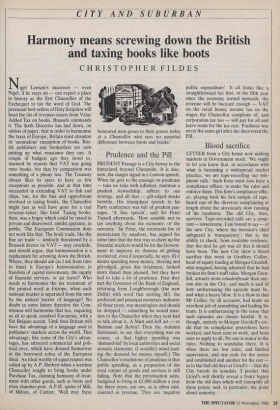CITY AND SUBURBAN
Harmony means screwing down the British and taxing books like boots
CHRISTOPHER FILDES
Nigel Lawson's successor — even Nigel, if he stays on — can expect a place in history as the first Chancellor of the Exchequer to tax the word of God. The perennial best-sellers of Holy Scripture will head the list of revenue-raisers from Value Added Tax on books. Brussels commands it. The Sixth Directive has laid down, on tablets of paper, that in order to harmonise the taxes of Europe, Britain must abandon its 'anomalous' exemption of books. Brit- ish publishers and booksellers are now putting up what resistance they can. A couple of budgets ago they stood to, alarmed by reports that VAT was going onto books, but that by comparison was something of a phony war. The Treasury always likes its taxes to have as few exceptions as possible. and at that time succeeded in extending VAT to fish and chips, but, for the fuss and opprobrium involved in taxing books, the Chancellor might just as well have gone for a real revenue-raiser, like food. Taxing books, then, was a bogey which could be raised in private and disavowed, amidst applause, in public. The European Commission does not work like that. The book trade, like the fine art trade — similarly threatened by a Brussels decree on VAT — may conclude, and should argue, that harmonisation is a euphemism for screwing down the British. Where, they should ask (as I ask from time to time) is Europe's harmonisation in freedom of capital movements, the supply of financial services, or air travel? Who needs to harmonise the tax treatment of the printed word in Europe, when each national market is separated from the next by the natural barrier of language? No doubt in some future directive the Com- mission will harmonise that too, requiring us all to speak standard European, with a flat Belgian accent. Until then Britain will have the advantage of a language used in publishers' markets across the world. That advantage, like some of the City's advan- tages, has attracted commercial and poli- tical envy, which have dressed themselves in the borrowed robes of the European ideal. An ideal worthy of equal respect was called up by A.P. Herbert when a wartime Chancellor sought to bring books under Purchase Tax, claiming harmony of treat- ment with other goods, such as boots and even chamber-pots. A.P.H. spoke of Mill, of Milton, of Caxton: 'Well may these honoured men groan in their graves today at a Chancellor who sees no essential difference between boots and books.'


































































 Previous page
Previous page